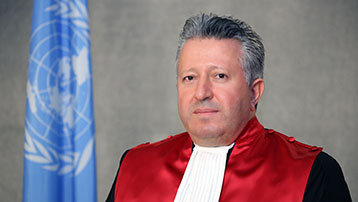
Türkiye

Date et lieu de naissance : 5 janvier 1972, Çarşamba Samsun (Türkiye)
Formation :
- 1989–1993 Faculté de droit de l’Université d’Ankara (Türkiye) (LL. B. en 1993)
- 1994–1996 Faculté de droit de l’Université d’Ankara (Türkiye) (LL. M. en 1996)
- 1996–1997 Faculté de droit de l’Université de Sheffield (Royaume Uni) (LL. M. en 1997)
- 1997–2000 Faculté de droit de l’Université de Bristol (Royaume Uni) (Ph. D. en 2000)
Connaissances linguistiques :
Maîtrise de l’anglais et du turc
Expérience professionnelle :
- 2000–2004 Maître de conférences, Université technique de la mer Noire, faculté d’économie et de sciences administratives, département des relations internationales, Trézibonde (Türkiye)
- 2005–2010 Professeur associé et chef du département de droit international, Université technique de la mer Noire, faculté d’économie et de sciences administratives, département des relations internationales, Trébizonde (Türkiye)
- 2007–2009 Professeur associé (temps partiel), Université Kadir Has, faculté de droit, Istanbul (Türkiye)
- 2010–2011 Professeur et chef du département de droit international, Université technique de la mer Noire, faculté d’économie et de sciences administratives, département des relations internationales, Trébizonde (Türkiye)
- Depuis 2011 Professeur, Université de Maltepe, faculté de droit, Istanbul (Türkiye)
- Depuis 2011 Chef du département de droit international et de droit public, Université de Maltepe, faculté de droit, Istanbul (Türkiye)
- Depuis 2012 Doyen de la faculté de droit, Université de Maltepe, Istanbul (Türkiye)
Affiliations :
- 2016–2022 Membre de la Cour permanente d’arbitrage
- Depuis 2015 Juge ad hoc près la Cour européenne des droits de l’homme
- 2009–2013 Membre de la Société européenne de droit international
- 2007–2010 Membre de l’Association du droit international
Distinction :
Déclaré l’un des plus jeunes scientifiques de l’année 2007 par l’Académie turque des sciences.
Publications principales :
A. Ouvrages :
1. Aksar, Y., Implementing International Humanitarian Law: From the Ad Hoc Tribunals to a Permanent International Criminal Court, London/New York,
Routledge: (2004).
2. Aksar, Y. (ed.). (2011) Implementing International Economic Law Through Dispute Settlement Mechanisms, Leiden, Boston, Holland/USA (Ağustos 2011).
3. Uluslararası Ceza Mahkemesi ve Uluslararası Ceza Usul Hukuku, ( International Criminal Court and Rules of Procedure and Evidence of International Criminal Law ),
Ankara: Seçkin Yayınevi, (2003).
4. Aksar, Y. Evrensel Yargı Kuruluşları, (International Judicial Institutions: Permanent Court of Arbitration, International Court of Justice, The International
Tribunal for the Law of the Sea and the International Criminal Court ), Ankara: Seçkin Yayınevi, (2007).
5. Aksar, Y. Teoride ve Uygulamada Uluslararası Hukuk I, ( International Law in Theory and Practice- I), 4th edition, Ankara: Seçkin Yayınları,2017.
6. Aksar, Y. Uluslararası Hukuk II, (International Law in Theory and Practice- II), 4th edition, Ankara: Seçkin Yayınları, 2017.
7. Aksar, Y. Temel Metinler ve Davalarla Uluslararası Hukuk, ( Cases and Materials on International Law), Ankara: Seçkin Yayınları, 2017.
B. Articles :
1. Aksar, Y., “The Concept of Individual Criminal Responsibility in International Humanitarian Law and Arab-Israeli Conflict in 2002,” The Review of International Affairs, 2/2, 91–114 (2002).
2. Aksar, Y., “The “Victimized Group” Concept in the Genocide Convention and the Development of International Humanitarian Law through the Practice of the Ad Hoc Tribunals,” Journal of Genocide Research, 5/2, 211–224 (2003).
3. Aksar, Y. The UN Security Council and the Enforcement of Individual Criminal Responsibility: The Darfur Case. African Journal of International and Comparative Law, 14/1, 104–119 (2006).
4. Aksar, Y. The Specific Intent (Dolus Specialis) Requirement of the Crime of Genocide: Confluence or Conflict between the Practice of Ad Hoc Tribunals and the ICJ, Uluslararası İlişkiler, Vol. 6, No 23, (Fall 2009), 113–126 (2009).
5. Aksar, Y. The Iraqi Special Tribunal: Nuremberg of the Twenty-First Century? Turkish Review of Middle East Studies, 16, 7–33 (2005).
6. Aksar, Y. The Concept of Command Responsibility? Superior or “Objective” Responsibility” in International Humanitarian Law: The Practice of the ICTY and the ICTR and Their Possible Impact on the ICC, Turkish Review of Balkan Studies, 17, 5–26 (2006).
7. Aksar, Y. Bir Uluslararası Suç Kategorisi Olarak Uluslararası Ceza Hukuku ve Türk Hukukunda İnsanlığa Karşı İşlenen Suçlar, Uluslararası Suçlar ve Tarih, 2, 135–150 (2006).
8. Aksar, Y. The Case of Thomas Lubanga Dyilo: The Implementation of a Fair and Public Trial at the Investigation Stage of International Criminal Court Proceedings, Ankara Bar Review, 2/2, 81–91 (2009).
9. Aksar, Y. “The European Court of Human Rights and the Cyprus Problem”, Ankara Üniversitesi Hukuk Fakültesi Dergisi, 50/3, 141–174 (2001).
10. Aksar, Y. “Birleşmiş Milletler Palmer (Mavi Marmara) Raporu ve Uluslararası Hukuk”, Uluslararası İlişkiler, V. 9, No. 33, (Spring 2012), 23–40 (2012).
11. Aksar, Y. “Uluslararası Bir Suç Kategorisi Olarak Soykırım Suçu ve Diğer Uluslararası Suçlardan Farklı Yönleri”, Maltepe Üniversitesi Hukuk Fakültesi Dergisi, Sayı 2014/2, 13–29 (2015).